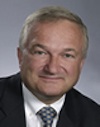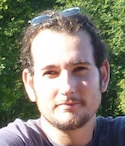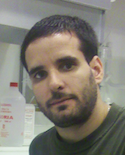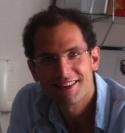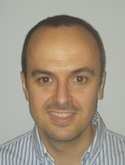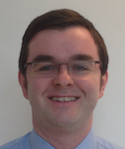Seven researchers were provided with Rodolphe Maheux Travel Grants to attend the 12th World Congress on Endometriosis.
These travel grants were made possible by donations from the Mangiagalli Journal Club Association, Professor Mette Moen, and Professor Ronald Batt from the proceeds from his book: A History of Endometriosis.
Julia Arnold
Julia Arnold is presenting her work on Estrogen receptor sub-type dependent macrophage activation leads to a sensory nerve outgrown in peritoneal endometriosis in the Main Seminar on “Mechanisms of pain”.
Julia Arnold currently is a fourth-year PhD student at the Endometriosis Research Centre at the Charite-Universitätsmedizin Berlin. She received her MA degree from the Martin-Luther-Universität Halle/Wittenberg in 2010 with two papers focusing on the nerve growth factor (NGF) over-expression in endometriosis and its contribution to pain.
Her main research interest is to understand how oestrogen and its receptor subtype-dependent signalling are involved in the pain mediation and neuroendocrine-immune interaction in endometriosis. Her paper about the nerve fibre imbalance in peritoneal endometriotic lesions greatly contributes to the understanding of pain and inflammation in endometriosis. Her work has been honoured at national and international meetings and she has received a visiting scholarship to broaden her skills at Professor Phillippa Saunders’ laboratory at the University of Edinburgh.
Kristeena Ray
Kristeena Ray is presenting her work on Novel mechanisms of nociception in animal and cell models of endometriosis in the main seminar on “Mechanisms of pain”.
Kristeena Ray is a 3rd year PhD student in the Biomedical Sciences Program of Marshall University School of Medicine in Huntington (USA), under the direction of Dr Nalini Santanam. Her work focuses on studying the mechanisms of pain associated with endometriosis. More specifically, she is investigating the inflammatory consequences of oxidative stress as well as the role of epigenetics in pain with a goal is to identify inductors of nociception in the hope of uncovering novel diagnostic and/or treatment options.
Being an engineer from Duke University, her knowledge of endometriosis was minimal at the outset of her research. The enigmatic aetiology of this disease caught her attention and the vast amount of patients suffering from its symptoms piqued her interest. Her deep passion for this field has developed and grown as she focussed on women’s health both inside the laboratory and within the greater community. In 2013, she was interviewed by 3and invited to become a guest lecturer for a women’s studies course at her university. She was also inducted into her institution’s Chancellor’s Scholars Program and the regional Southern Regional Education Board Scholars program, both designed to recognise minority doctoral students based on academics and merit.
Carlos Alvarado-Dias
Carlos Alvarado-Díaz is presenting his poster on the Effect of iron overload on nuclear factor-kappab(nf-kb) pathway activation in endometrial stromal cells (ESC) in the topic of “Pathogenesis/Aetiology”.
Dr Carlos Alvarado-Días is a biochemist with a PhD thesis in biomedical sciences entitled Iron overload effect on NF-kB activation in human endometrial stromal cells as possible mechanism associated to endometriosis pathogenesis under the supervision of Dr Reinaldo González-Ramos at IDIMI (Child and maternal research institute), Universidad de Chile.
He has always liked human reproductive biology, and endometriosis is a very important public health issue worldwide. This is why he, during the last 4 years, focused his investigation on the mechanism by which iron overload could be associated with the aetiology and development of the disease. He also contributed by working in a study about NF-kB activation in the endometrium of healthy women and endometriosis patients that was published recently by our team. The results of his PhD thesis, which will be presented druing WC2014, show participation of iron overload in endometriosis pathogenesis.
Juan Ignacio Baston
Juan Ignacio Bastón is presenting his poster Galectin-1 plays a pivotal role in endometriosis by promoting the vascular network development in endometriotic lesions in the session of “Pathogenesis/Aetiology”.
Juan Ignacio Bastón is a molecular biologist, carrying out a PhD thesis in the Endometrial Pathophysiology Laboratory at the Biology and Experimental Medicine Institute in Buenos Aires, Argentina.
His goal is to understand the pathophysiologic mechanisms that promote the growth and vascular development of the endometriotic lesions. Since endometriosis shares biological features with cancer, and the endogenous lectin, Galectin-1, plays a pivotal role promoting tumor growth and angiogenesis, his team has studied the role of Galectin-1 in endometriosis.
His team found that this lectin is specifically expressed by stromal and endothelial cells of human endometriotic tissue, but not by endometriotic epithelial cells. In addition, they used different experimental models of endometriosis induced in wild type and Galectin-1-defficient mice to show that Galectin-1 exerts an essential role in orchestrating vascular development of endometriotic lesions in vivo, promoting the enlargement of the ectopic lesions. Importantly, the targeted blockade of Galectin-1 with a neutralising antibody at peritoneal level significantly reduces the size and vascularised area of endometriotic lesions induced in wild-type mice. The overall objective of this initiative has been to elucidate the underlying mechanisms of endometriosis occurrence and to provide the basis to achieve more efficient therapies to improve the patient’s outcome.
Jonathan Cohen
Jonathan Cohen is presenting his work on the Effect of induced peritoneal endometriosis on oocyte and embryo quality in a mouse model in the session on “Infertility and ART”.
Jonathan Cohen is a French fellow in Émile Darai’s team in Paris. He is an OBGYN and especially orientated in ART medicine.
He is interested in endometriosis-associated infertility and is working on a mouse model.
Raul Gomez
Raul Gomez is presenting his work on A combined approach of nerve fibre detection plus infrared spectroscopy profile in eutopic endometrium out-performs the capacity of each single technique to non-invasively diagnose endometriosis in the main seminar on “Non-invasive diagnosis”.
According to Dr Gomez, deregulated angiogenesis seems to be a common component to several reproductive related disorders such as PCO, OHSS, preeclampsia, and of course endometriosis. The possibility of treating those illness by repairing their deregulated pathological angiogenic component but without affecting the physiological angiogenesis in reproductive organs has always fascinated him. With that goal in mind he started his research as a pre doc at the IVI foundation in 1999 focused specifically on OHSS under the supervision of Dr Antonio Pellicer. After 5 years the team found in dopamine agonists a non-toxic tool to inhibit VEGFR2 without affecting fertility and published proof of concept (Endocrinology 2006) and preclinical studies (JCEM 2007) in humans showing their efficacy in treating. Subsequently they moved their focus to endometriosis and repeated the same strategy by assaying the efficacy of dopaminergic drugs in treating the illness in mouse models (Hum Reprod 2007) and humans (Fertil Steril 2011). Currently they are devoted to assaying the efficacy of new drugs in the treatment of endometriosis. For such purposes we have improved the existing homologous and heterologous mouse models of endometriosis with the non-invasive (fluorescent) assessment of endometriotic lesions implanted in them. In the last years they have also gained a growing interest in combining several techniques, instead of a single one, for the early non-invasive diagnosis of endometriosis, which will be presented at WCE2014.
Tom Holland
Tom Holland is presenting his work on Ultrasound mapping of pelvic endometriosis: does the location and number of lesions affect the diagnostic accuracy? A multicentre diagnostic accuracy study in the main seminar on “Non-invasive diagnosis”.
Mr Tom Holland is a senior trainee in obstetrics and gynaecology and is currently completing an Advanced Training Skills Module in advanced laparoscopic surgery with the endometriosis team (Alfred Cutner and Ertan Saridogan) at University College London Hospital, England. He has completed a Research Doctorate on the use of ultrasound and serum markers for the diagnosis of severity of endometriosis. This research interest arose while working as a Research Fellow for Mr Davor Jurkovic on the diagnosis of ovarian tumours. It quickly became apparent that there was more work needed on the non invasive diagnosis of endometriosis. To date three of the chapters of the Doctoral Thesis have been published as papers. Tom has contributed to a further 16 papers regarding the ultrasound diagnosis of ovarian pathology or the use of ultrasound in gynaecological practice. He has won prizes for his scientific work at the British Society for Gynaecological Endoscopy and The International Society of Ultrasound in Obstetrics and Gynaecology.
The following investigators were provided with free registration to WCE2014 in order to present their work:
- Alison Hey-Cunningham
- Konstantinos Nirgianakis
- Mariela Bilotas
- Brett David McKinnon
- Naomi Alison Shadbolt
- Maria Luisa Barcena de Arellano
- Maryam Moradi
- Analia Gabriela Ricci
Want to contribute to future travel grants?
Please contact wes@endometriosis.ca — all contributions to enable young investigators to present their work at world congresses on endometriosis are gratefully received.

